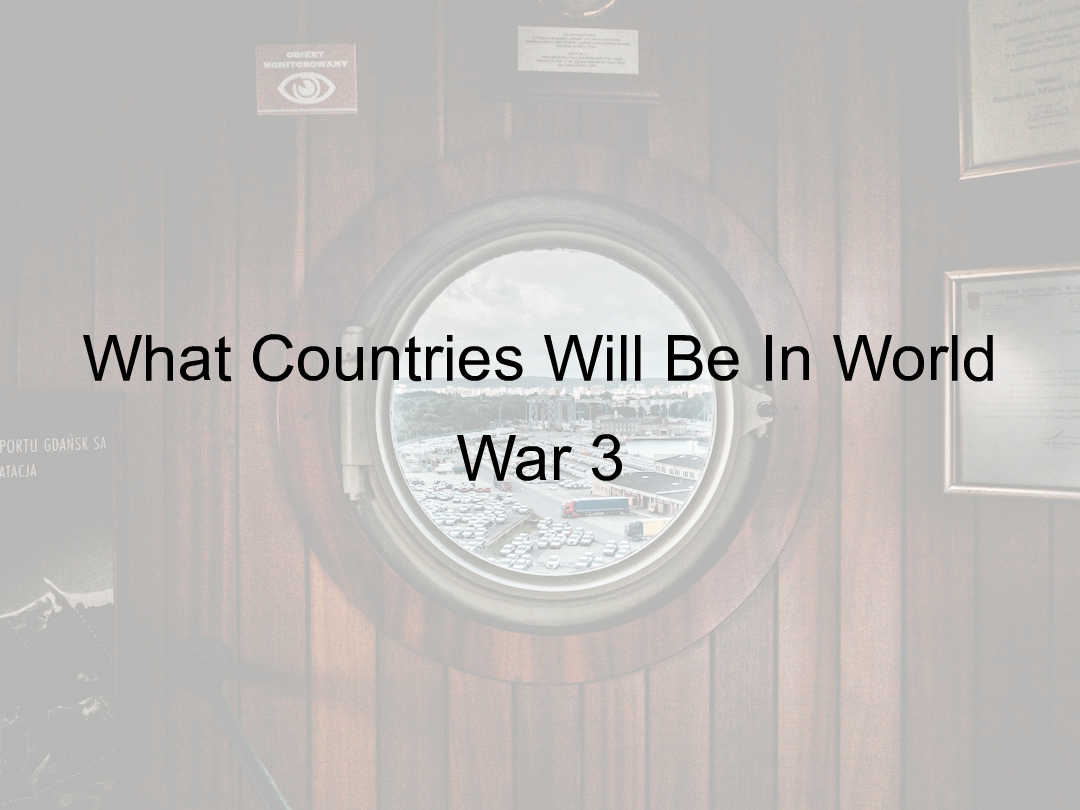As we delve into the topic of potential global conflict, it’s essential to examine the geopolitical tensions that could lead to another large-scale war. World War 3 is a term that evokes fear and concern, yet understanding its possible origins can help us navigate the current landscape. Many factors, including territorial disputes, resource competition, and political alliances, contribute to this complex scenario. While predicting the exact countries involved may be challenging, we can analyze the regions where tensions rise and the stakes increase. This article will explore the nations that might play significant roles in a hypothetical future conflict.
Historical Context: Lessons from World Wars I and II
The global upheavals of the First and Second World Wars offer valuable insights into the fragility of peace and the complexities of international relations. Conflict emerged from a tangled web of nationalism, economic strife, and political ambition. While we study these events, it is crucial to consider the profound consequences that followed. History teaches us that our shared humanity often falters in the face of propaganda and fear. By reflecting on these lessons, we may cultivate a more hopeful future.
- Empathy: Understanding diverse perspectives can prevent future conflicts.
- Communication: Open dialogues foster trust among nations, diminishing misunderstandings.
- Resilience: Societies that prioritize recovery remain stronger when faced with adversity.
Geopolitical Tensions: Key Players and Potential Alliances
In today’s world, geopolitical tensions seem to escalate daily. Key players like the United States, China, and Russia navigate intricate power dynamics. These nations often find themselves at odds, fueling a climate of uncertainty. For instance, while cooperation is essential for global stability, diverging interests might lead to unexpected alliances or conflicts. The European Union, meanwhile, attempts to mediate these tensions. Understanding these shifting landscapes proves crucial. Ultimately, the implications of these relationships could redefine our international landscape.
The Role of Economic Sanctions in Modern Warfare Dynamics
Economic sanctions have become a crucial tool in contemporary conflicts, impacting nations at multiple levels. These measures, while designed to coerce political change, often lead to unintended consequences. For instance, weakened economies can foster desperation among citizens, sometimes fueling resistance rather than compliance. Moreover, the effectiveness of sanctions can vary significantly based on the targeted country’s ability to adapt. In a world where traditional warfare is evolving, understanding these complexities is essential for policymakers.
Emerging Technologies: How Cyber Warfare Could Shape the Next Conflict
As nations delve deeper into the realm of cyber warfare, a bewildering shift in conflict dynamics emerges. This new battlefield, largely invisible yet profoundly impactful, forces military strategists to reconsider traditional tactics. The integration of advanced technologies, such as artificial intelligence and quantum computing, not only enhances offensive and defensive capabilities but also invites ethical dilemmas. Consequently, conflicts might unfold in unpredictable ways, challenging our perceptions of warfare.
Key Considerations in Cyber Warfare
- Attribution Challenges: Identifying the source of cyber attacks can be incredibly complex, often leading to confusion and escalation.
- Impact on Civilians: Civilian infrastructure is increasingly vulnerable, raising questions about the ethical ramifications of such strategies.
- Global Alliances: Cyber capabilities may reshape international alliances, as countries with advanced technologies could hold disproportionate influence.
Ultimately, navigating this intricate web involves a delicate balance between technological advancement and moral responsibility. The implications are vast, and the world watches closely.
The Impact of Climate Change on Global Stability and Conflict
Climate change profoundly affects global stability, intertwining environmental challenges with social tensions. As resources like water and arable land become scarcer, competition intensifies. Nations may find themselves in conflict, not just over territory but also essential resources. Furthermore, migration patterns shift dramatically, often leading to strained relations between communities. The intricate links between climate effects and geopolitical tensions cannot be overlooked. Strong action is essential to mitigate these threats and foster a more stable future. Understanding this relationship remains crucial.
Public Sentiment and Media Influence: Preparing for the Unthinkable
In today’s rapidly evolving landscape, the connection between public sentiment and media influence has never been more critical. As events unfold, the media shapes perceptions, often guiding our emotional responses. This dynamic can lead to unexpected consequences. For example, a single narrative can spark widespread fear or hope, altering decision-making processes. Understanding this relationship is essential for navigating today’s complex realities. We must remain vigilant in our analysis of information, questioning what lies beneath the surface.
“The single story creates stereotypes, and the problem with stereotypes is not that they are untrue, but that they are incomplete.” — Chimamanda Ngozi Adichie
Moreover, as we face unprecedented challenges, preparing for the unthinkable becomes imperative. Staying informed and critical allows us to engage constructively with the media.
Frequently Asked Questions
What are the potential causes of World War 3?
Potential causes could include geopolitical tensions, resource scarcity, territorial disputes, and rising nationalism among countries.
Which countries are most likely to be involved in World War 3?
While it’s difficult to predict, tensions between major powers such as the United States, China, and Russia could lead to their involvement, along with regional powers in conflict zones.
What impact would World War 3 have on global economies?
A global conflict could lead to devastating economic downturns, supply chain disruptions, and increased military spending, significantly affecting both developed and developing nations.
How can nations prevent the outbreak of World War 3?
Diplomatic efforts, effective communication, conflict resolution strategies, and multilateral agreements can help prevent escalations into a major global conflict.
What are the possible outcomes of World War 3?
Outcomes could range from a swift resolution and return to normalcy to long-term devastation, significant loss of life, changes in global power structures, or even the use of nuclear weapons.
